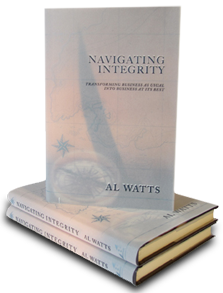We were on a nice port tack, but Raspberry Island was coming up fast; we needed to come about. I coached my nephews – one at the wheel and one at the winches – how to execute the maneuver, so soon we were “hard-a-lee,” turning through the wind to begin our starboard tack. There was only one problem: a giant cabin cruiser was bearing down fast, on a collision course. Rules of the road dictated that we had the right of way and should hold our new course; fortunately the cruiser’s skipper was paying attention and quickly altered direction; all we had to contend with was a pretty decent wake.
Reflecting on what had just happened, or could have happened, I thought about the “Accountability” chapter in my book Navigating Integrity – Transforming Business As Usual Into Business At Its Best. A large part of accountability is “paying attention to what matters.” In some cases that means just that – we are accountable when we pay attention to circumstances and factors that impact our ability to execute a strategy or reach our goals. I was not as accountable as I should have been by failing to notice that tacking just then would put us on a collision course with the cruiser. I was distracted while explaining the mechanics of coming about. (See “Distractions.”)
That got me to thinking about how organizations and their leaders can also be blind to hazardous developments. For organizations, the “cabin cruiser “ could be a surprise move by a competitor, game-changing technology or a non-traditional competitor that “comes out of left field.” Kodak was caught flat-footed when digital technology overtook traditional photography; not paying sufficient attention to e-publishing and Amazon contributed to the demise of traditional publishing and book stores; traditional retailers that mainly competed with other traditional retailers are all still scrambling to compete against internet sales channels. Leaders who focus only on their immediate areas or on operational details can likewise be blind-sided (See “Watch Your Blind Side”) by adverse power shifts or surprise external developments. Like our tacking maneuver, we are vulnerable when focused only on day-to-day execution and blind to developments outside our standard field of vision.
Accountability also means paying attention to the measures that matter, as we discovered earlier in our sailing trip. LOON is equipped with a wind gauge that reports wind speed and direction. One way of maintaining speed is slightly altering course to keep sails in their “sweet spot” or best angle to the wind. As one nephew soon discovered, however, focusing too much on the wind gauge can also detract from seeing the bigger picture and take us off course. The “good news” is that we were going fast; the “bad news” is that it was in the wrong direction! Organizations and leaders too can get off course by focusing on only one measure. Of course organizations must be cost efficient and profitable, but if those are the only measures that they really pay attention to, and especially if the focus is short-term profitability, they are likely to end up on the rocks. In my work and writing I talk about “triple-E” leaders and organizations – those that realize sustainability requires attention not only to effectiveness (including efficiency and profitability,) but also ethics and employee engagement. There is usually no shortage of measures for organizational efficiency and profitability, but almost always deficiencies paying sufficient attention to ethics and engagement.
Here are some suggestions for improving accountability by measuring and paying attention to what matters:
- Commit to measuring engagement and ethics in addition to efficiency and profitability. Pay attention to trouble signs or declining indicators in equal measure for all dimensions.
- Make sure that everyone knows what your key measures are, and make results visible.
- Pay attention to “leading indicators” as well as “lagging indicators.” Summary measures of customer satisfaction, for example, are lagging indicators. Measures of what contributes to customer satisfaction (call response time, for example,) are lagging indicators.
- Engage others determining what useful measures should be, and determining responses to measures that are unsatisfactory.
- Focus on a few key measures at a time, and eliminate measures that just consume time and add little value.
- Establish mechanisms and disciplines for improving awareness of potentially game-changing developments. Examples include deliberate scanning of seemingly far-removed technologies or competition, recruiting team members with new or different perspectives (and listening to them,) and “blue-sky” strategy sessions.
- Every once in a while, step back and make sure that you’re still “seeing the forest for the trees” and basically on course. Operational indicators may all look healthy, but are you still making progress toward your big goals and fulfilling your mission?
Our sailing trip ended well. We reached our destination and returned safely, we became more proficient sailors, and we all learned something about accountability.
In your life and work, are you paying attention to what matters? What are your indicators or measures to know if you’re on course
Is your organization measuring and paying attention to what matters? What actions should it take, or measures should it adopt, that would help assure it is on course and not likely to be surprised?
Many of the things you can count, don’t count. Many of the things you can’t count, really count.
Albert Einstein
No man can tell if he is rich or poor by turning to his ledger. It is the heart that makes a man rich. He is rich according to what he is, not according to what he has.
Henry Ward Beecher
Some favorite expressions of small children: “It’s not my fault. . . They made me do it. . . I forgot.” Some favorite expressions of adults: “It’s not my job. . . No one told me. . . It couldn’t be helped.” True freedom begins and ends with personal accountability.
Dan Zadra








Spot on Al,
To create results, balance, effectiveness, accountability, resilience, and so much more you need to know what to focus on, what really matters, and why it is that it matters so much. I think organizational and leadership values play a foundational role in this process, and living them constantly and consistently. Thanks Al, for once again stimulating my thinking and reflecting.